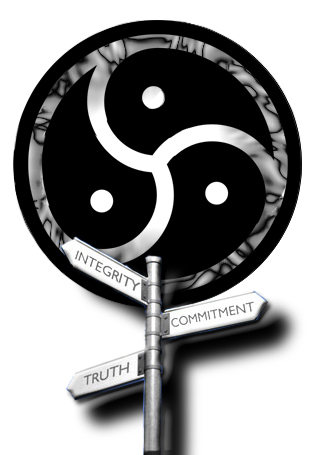Kink & BDSM Ethics
Ethics is involved in every topic in one way or another and BDSM is no exception. The trouble with ethics is that they tend to evolve as society and culture evolves given that ethics is defined by the structure of culture's moral principles (LLC, 2011).

For some people, there is the view that BDSM will ultimately result in crimes of deprivation and extreme violence and while there is definitely a concern for safety and some truly unbalanced individuals, most of the community will follow certain ethical guidelines and safety rules (ASJ, 2002). These guidelines are especially important since those in the community are susceptible to persecution and discrimination from the public (Socyberty, 2011).
Consent: Foundation of BDSM Ethics
The most important ethical consideration in BDSM is mutual consent (ASJ, 2002). The border between the abuse and intensity in power exchange situations and relationships can be difficult to separate, especially for those newer to the lifestyle (Raventstone, 2011). This increases the importance of expressed consent and not implied consent in all BDSM situations. It is the responsibility of both players to be open and communicate their needs but it is also the responsibility of the Dominant/Top to monitor the submissive/bottom for their level of comfort and to ensure that they are not consenting to play that will conflict with their long term interests and functioning (Kitty, 2000).
Ethical Use of Safewords

So how do you ensure consent when protestation can be part of the game? Most players set up a safeword system; a word or phrase that will unquestionably halt all play for the physical, mental, or emotional safety of the submissive/bottom.
There may be a single safe word for a full stop to play or a system of words that indicate different states such as "Everything's great, continue" or "This level is ok but do not increase the intensity". Typically the word "no" should never be considered a safe word (Kitty, 2000). The safe word should be a word that both play partners should feel comfortable with but would not come up in a play situation.
Another consideration when it comes to safe words is to remember that the safe word is there to protect the dominant/top in the play scenario as well. In most cases, it will probably be the submissive who will be more in need of a safe word but depending on a play scenario and the history of a player, a dominant may wish to employ this safety system as well. It is important that when a safe word is used, by either player, that the partner desists in all play activity and follows up with any aftercare and support that may be needed for the well being of their partner.
Important Moral Considerations

Some other important ethical considerations can include but not limited to:
- Proper knowledge - be knowledgeable about the kink your engaging in. This will ensure you are accountable and reduce the risks to maximize the safety of all players involved (Stein, 2005). It is always a good idea to practice a new kink before using it on someone.
- Behave ethically - it is not enough to say you are an ethical person but you must act in accordance to those ethics. If you behave unethically in other areas of your life, this will reflect on you within the community and the community generally does not tolerate unethical players (Raventstone, 2011)
- Ensure a safe environment - try to remove and minimize environmental risks during your play. Be aware of potential environmental dangers such as open flame candles, insecure equipment, etc. Be sure to properly sanitize and clean all toys and equipment (Wicked Eden, 2006). You should also be aware of your partners; be aware of their fantasies as well as emotional and physical limitations to ensure that you set up your play environment to respect those limitations (Rage, 2011)
- Honesty - it is incredibly important to be honest with your partner. Do not omit necessary information. Do not make promises you cannot commit to and do not pretend to be someone you are not outside of a structured role play scenario (Stein, 2005)
- BDSM is not therapy - Do not expect your partner to be a substitute for a therapist unless you have that as an aspect of your relationship. If you have legitimate issues that you feel you need help for, seek the appropriate professional, do not expect your BDSM partner to fill this role (Stein, 2005)
- Do no harm - there is a difference to inflicting pain and doing harm. Be conscious of your partners desires and limits and to stay within those parameters. Inflicting indiscriminate, unintentional, or unwanted pain on your partner is the red flag of a bully or an abusive partner. If pain is inflicted in a scenario, it should be intentional and with consent (Stein, 2005)
- Respect privacy - not everyone is able to live an alternative life in the open. Be aware of your play partner's situation and do not out their alternative life without their permission
- Complete the experience - do not begin a session with a play partner unless you are prepared to see to their needs and be able to provide what they need to come back from the BDSM headspace that they may go into. This means that you should be prepared to see to their emotional and mental needs, along with physical that falls within the range of your relationship with them (Stein, 2005)
- Take care of and respect yourself - take care of your own physical, mental, and emotional health before engaging in play. Be at a place of stability. You deserve that for yourself and your partner deserves to play with someone who will be present in the session.

Article References
ASJ. (2002). Ethics in Bondage, Discipline, and Sado-Masochism. Retrieved 09 10, 2011, from ASJ Community: http://www.asubmissivesjourney.com/ethics.html
Kitty, S. (2000). Ethics in BDSM. Retrieved 09 15, 2011, from Leathern Roses: http://www.leathernroses.com/generalbdsm/kittyethics.htm
Rage, M. (2011, 08 15). Professional Dominatrix. (M. Kashiko, Interviewer)
Raventstone, D. (2011). Why Ethics are Important in BDSM. Retrieved 09 19, 2011, from Promise to Play Safe: http://www.promisetoplaysafe.com/ethical.html
Socyberty. (2011, 01 08). The Paradox of BDSM: Research Ethics. Retrieved 09 18, 2011, from Socybery: http://socyberty.com/issues/the-paradox-of-bdsm-research-ethics/
Stein, D. (2005). Some Principles of Ethical BDSM. Retrieved 09 16, 2011, from Sagacity: http://sagacitygroup.net/main/knowledge/thoughts/principles
Wicked Eden. (2006). Ethics in Professional BDSM. Retrieved 09 17, 2011, from Wicked Eden: http://wickededen.com/blog/snow/ethics-in-professional-bdsm/
Image References
Someone else's art deserves recognition! The images presented in this article were borrowed from the following places:
Header Image: http://www.un.org/en/ethics/images/ethics.jpg | Retrieved April 6, 2015
Image 1: Created by Fallen People Entertainment
Image 2: http://www.jahpumpsmotorsuppliers.com/storage/00_blog_ethics1.jpg?__SQUARESPACE_CACHEVERSION=1312163594470 | Retrieved September 20, 2011
Image 3: http://www.vergemagazine.com/images/stories/article%20photos/79-ethics--road-sign.jpg | Retrieved September 20, 2011
Image 4: http://www.subliminalhacking.net/wp-content/uploads/2010/08/Got-ethics.jpg | Retrieved September 20, 2011